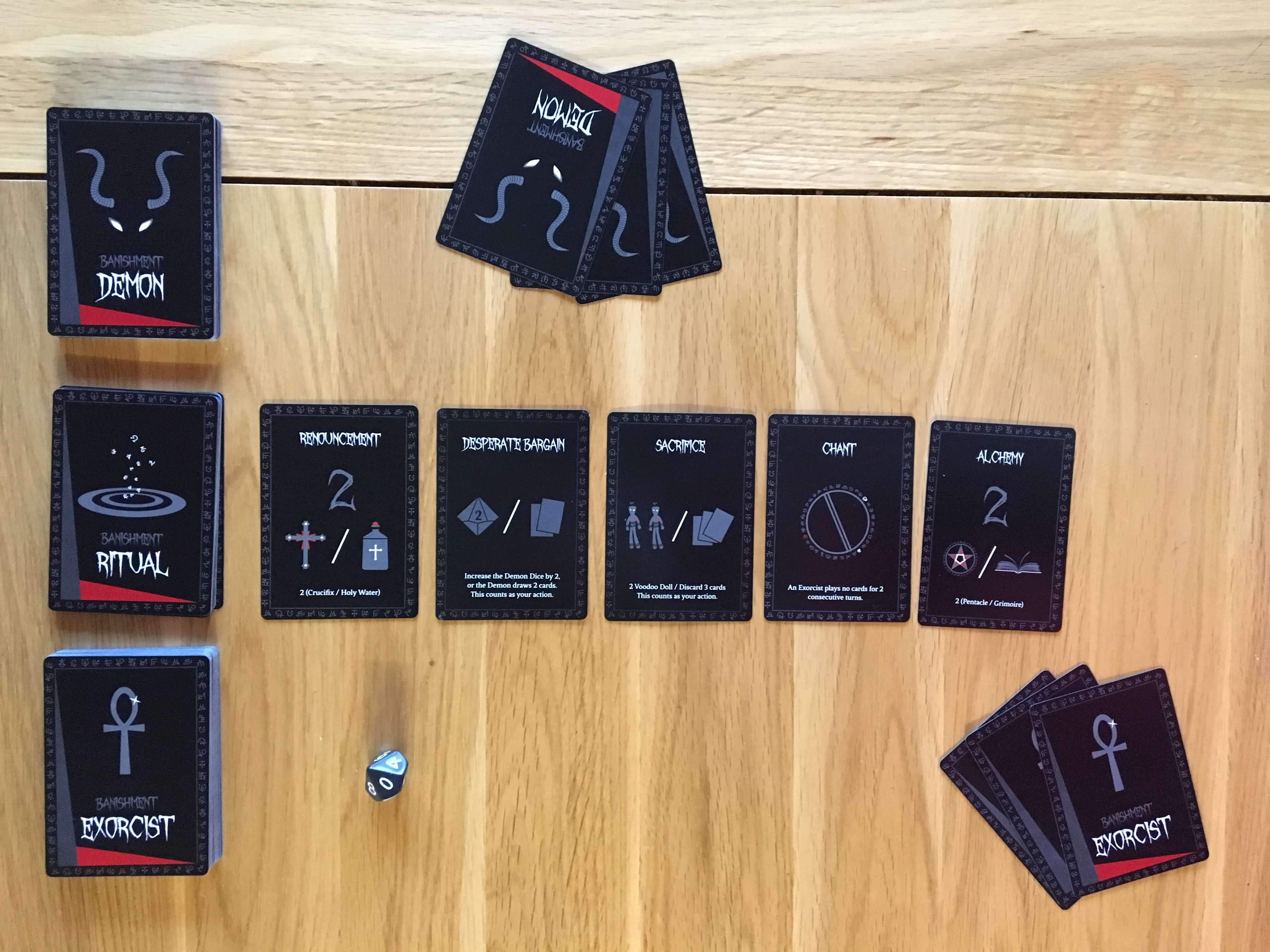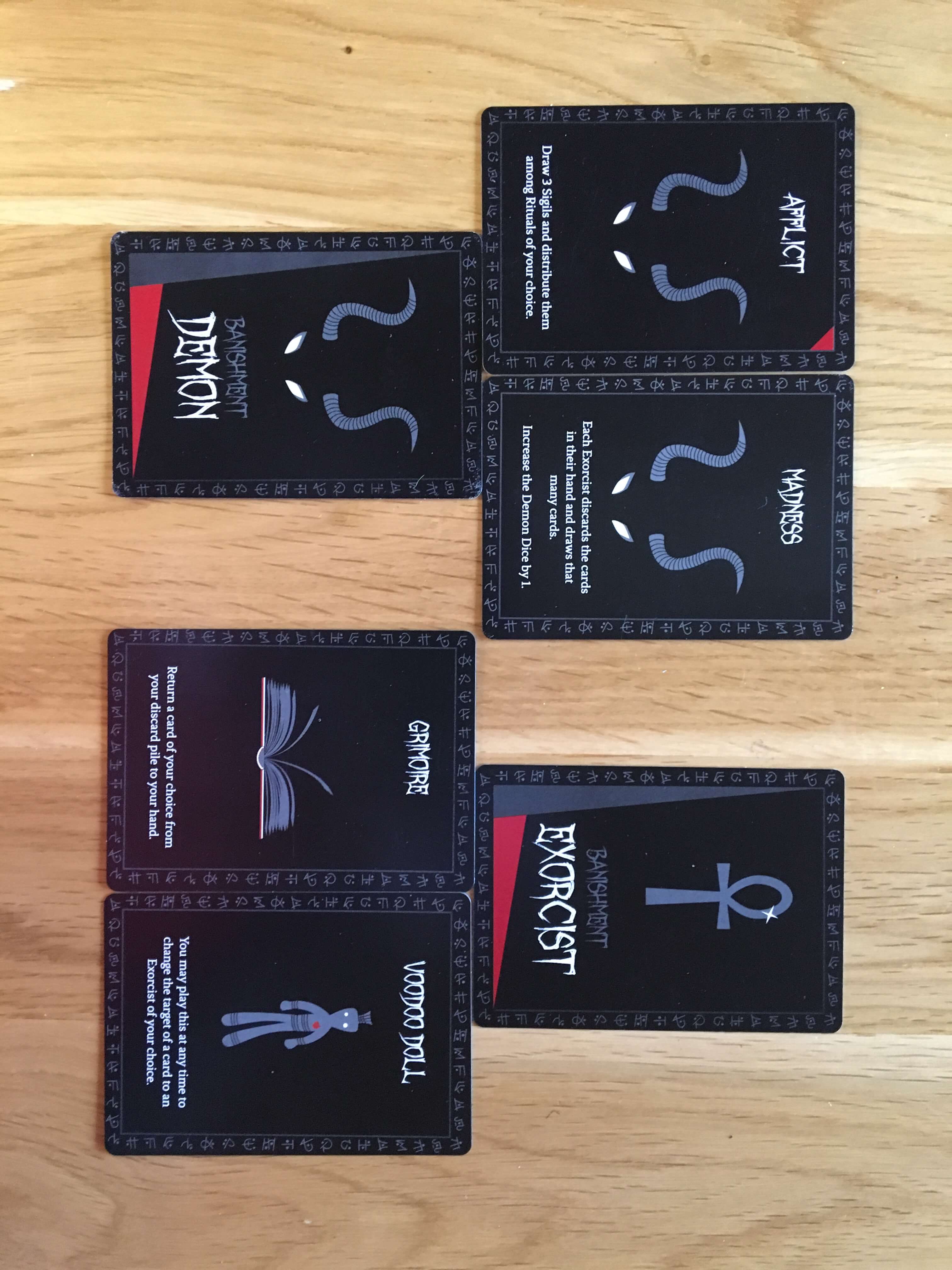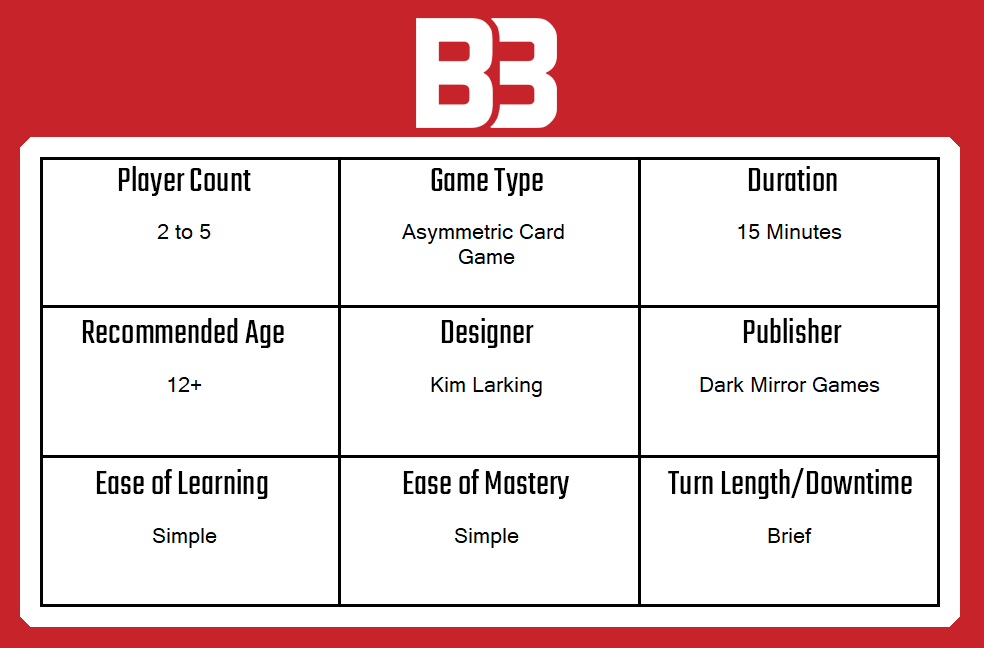Banishment review — Ouija board… game?
![]()
- Banishment is a fairly recent card game from Kim Larking, AKA Dark Mirror Games. Although it comes from a small indie studio, Banishment is produced to a very high standard and it features a strong, thematic push towards its titular activity, which happens to be exorcising a demonic presence. Sitting somewhere between party game and light, card strategy, Banishment is an ideal small box game for Halloween, or on any other occasion when you feel the need for a bit of spooky fun.
Overview and turn structure
Banishment can be played competitively between a team of exorcists fighting a single demon, or as a cooperative team game if you combine two copies of the base game. I haven’t been able to try the latter (called The Cult War) so this review is exclusively focused on what, I guess, you might call the standard mode.
During setup, the players will set up a number of Ritual cards on the table. Each of the individual rituals will need to be resolved by the exorcist team before the demon’s dice reaches ten — at which point the demon wins. Resolving rituals involves placing one or more cards onto each ritual, as directed. For example a ritual might require candles, incense and a cross to be placed onto it. Each of the exorcist cards has at least one other use however, such as rolling back the demon dice or similar. A turn for each exorcist will always involve making the tough decision between drawing cards, using cards in hand for their action or resolving a ritual.
The demon, by contrast, will act alone and usually, he or she will have to watch for a while whilst the exorcists build up their hands and/or collect items for rituals. Once that’s done, the demon will have a turn of their own, which will (if the demon intends to win) involve undoing as much of the exorcists work as possible. Banishment is highly asymmetrical and involves lots and lots of interaction. The demon, in particular, will spend a lot of their time forcing the exorcists to discard cards, interfering with rituals, winding the demon die forward faster that it should go (it normally ticks up by one at the beginning of each demon turn) and similar.
Eventually, the exorcists will either manage to meet the requirements of all the rituals, or the demon die will reach ten. In either case, the game ends and either the exorcists or the demon will win. In The Cult War mode that I mentioned earlier but haven’t played, the teams are each representing a different cult, both of whom are racing to summon their own dark master — as such the flavour and theme of the game are subtly changed.

Components
Considering that it has been designed and produced by a small, indie team on what I presume will have been a tight budget (don’t quote me on that), Banishment is a really fantastic product. The box is small and almost entirely black, with a combination of only red detailing and white text casting a stark contrast. This theme is retained throughout the rest of the components, which are simply made up of four decks of cards (exorcist, demon, ritual and The Cult War), an instruction manual and a black and white ten sided dice.
The cards are of standard playing card size and feature limited artwork that is basic and minimalist, but well suited to the theme and consistent in style. The instruction manual is small and only a few pages long, but sadly there were a few areas that confused me. The Cult War requiring a second deck didn’t seem to be clearly explained and on occasion, the instructions miss key words — dealing rituals from the ritual deck is obvious, but saying it is sort of what I would expect. Nothing gave me pause for more than five seconds and even if you find yourself in doubt, Dark Mirror Games has published a useful tutorial video that can be found easily.

Game experience
There are probably two or three things that make Banishment stand out as a gaming experience, which are just how different it feels to play as one of the exorcists or the demon. This game is perhaps one of the most asymmetrical experiences that I’ve had in a while, yet it feels very balanced. The demon has powerful, almost unfair feeling effects, but the number of times he or she will be able to use those effects are much fewer than the exorcists. The number of rituals needed controls balance at different player counts and can be used to further fine turn if you do feel balance is a problem.
The second thing that I like about Banishment is how interactive it is. Games these days often shy away from negative interaction, or where they do feature it, it feels throttled. This is especially true of larger, longer games where imbalances or powerful effects might ruin someone’s experience. Banishment doesn’t need to worry about that, since the theme demands such interaction and it really feels like what is happening on the table is powerful — completed rituals do feel as if they weigh the demon down, but on the next turn, he or she will break free with a series of powerful cards. It feels very much like a light recreation of a scene from a horror movie.
Finally, that theme itself is very appealing and exciting to me. I was warned by the designer when I accepted the review that if I had strong religious views I might be offended. I agree — if you’re a devout churchgoer who doesn’t enjoy the concept of demonic possession then you should steer clear, but similarly if that concept doesn’t bother you, then know that Banishment embraces it fully and really makes the most of it. The demon is powerful, the exorcists feel desperate and ten turns is not a lot of time — the overall effect is exciting for both sides and at fifteen minutes per game, you can swap sides so that everyone can be the demon very easily.

Conclusion
Banishment is a really fun game that I think really excels with higher player counts and perhaps even some spectators. I’d love to have tried The Cult War expansion and I think if you intend to use Banishment in a party setting, then buying a second copy at the same time as you purchase the first would be a wise decision, given that it’s not an expensive game (but shipping twice could be). Banishment is not a game for everyone thanks to its theme, but I still think it offers a fun and unique experience that uses asymmetry and interaction to great effect and in a way that might be less powerful with a more vanilla setting. All in all, a solid recommendation from me.
A copy of Banishment was provided for review purposes. You can find out more about it on the website of publisher Dark Mirror Games.

Comments are closed.